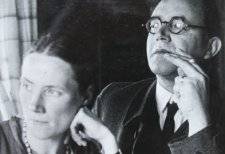As I have written previously on Barth’s unrepentant sin, with reference to his relationship with Charlotte von Kirschbaum, it is completely unacceptable. But when it  comes to his theological themes, for me, those are loci that bear witness to Jesus Christ in ways that I have never seen any other theologian accomplish in the same type of way (TF Torrance is very close). His doctrine of election, as a reformulation of the classically Reformed doctrine of election, is brilliant; and it solves a gazillion problems that attend the classical Reformed and Arminian versions of the same doctrine. His anti-natural theology (anti-analogia entis) teaching presents a genuine offering of what can only be described as ‘revelational theology.’ Barth doesn’t attempt to ground his theological project in speculative means, such as we get with the scholastics, among others. Instead, he intensively and principially thinks God only as God has first given Himself for us in His Self-revelation in Jesus Christ. This is his theological prolegomenon. It isn’t apologetic, but genuinely confessional; genuinely Christian. Barth, then, comes naturally to his focus on the Trinity as the sine qua non and ground of his theological ethos. He thinks the Trinity from a radical theology of the Word; which of course makes his theology consistently Protestant and even Reformed. Barth expands on, and develops a theology of the Word that provides deep reality for the Scripture Principle; as the Scripture Principle gains gravitas insofar that Scripture’s own ‘ontology’ only comes to be as it points beyond itself to its reality in Jesus Christ. This is all couched in Barth’s doctrine of the threefold form of the Word (i.e., the living Logos/Word, Jesus Christ; the written Word; and the proclaimed/preached Word; the latter two finding their reality, again, in the eternal Logos, Jesus Christ).
comes to his theological themes, for me, those are loci that bear witness to Jesus Christ in ways that I have never seen any other theologian accomplish in the same type of way (TF Torrance is very close). His doctrine of election, as a reformulation of the classically Reformed doctrine of election, is brilliant; and it solves a gazillion problems that attend the classical Reformed and Arminian versions of the same doctrine. His anti-natural theology (anti-analogia entis) teaching presents a genuine offering of what can only be described as ‘revelational theology.’ Barth doesn’t attempt to ground his theological project in speculative means, such as we get with the scholastics, among others. Instead, he intensively and principially thinks God only as God has first given Himself for us in His Self-revelation in Jesus Christ. This is his theological prolegomenon. It isn’t apologetic, but genuinely confessional; genuinely Christian. Barth, then, comes naturally to his focus on the Trinity as the sine qua non and ground of his theological ethos. He thinks the Trinity from a radical theology of the Word; which of course makes his theology consistently Protestant and even Reformed. Barth expands on, and develops a theology of the Word that provides deep reality for the Scripture Principle; as the Scripture Principle gains gravitas insofar that Scripture’s own ‘ontology’ only comes to be as it points beyond itself to its reality in Jesus Christ. This is all couched in Barth’s doctrine of the threefold form of the Word (i.e., the living Logos/Word, Jesus Christ; the written Word; and the proclaimed/preached Word; the latter two finding their reality, again, in the eternal Logos, Jesus Christ).
There are many other significant offerings provided for by Barth’s theology, things most people aren’t aware of because they only engage with Barth through his caricatures. Yes, Barth’s theology comes from a sinful man, and there is nothing virtuous or acceptable about any of that! But Barth, as you read him, ends up contradicting his own lifestyle (with Charlotte) because of his slavish commitment to a genuine theology of the Word. That’s what makes engagement with Barth so paradoxical; he confounds his own lifestyle because the Word of God, which he is committed to as a matter of theological profession, confounds said lifestyle.
And all of the above noted, just remember, every time you read a dead theologian, or even living ones; every time you listen to a theologian lecture, or a pastor preach; they all have sins, some more egregious than others, plaguing their lives. And some, throughout all of Church history, and into the present, lived with unrepentant sins that we will never know about. And yet you benefit from them; in fact, you might even see them as heroes of the Christian faith. This isn’t a rationalization for not living holy lives, in fact it is just the opposite. It ought to sober every single one of us in the sense that more than likely we all have unrepented of sins that we have come to accept as not that serious; we have figured out ways to live with them. And at the same time we might have Christian profiles that others want to emulate or learn from. What this presses me to do is to passionately seek God’s mercy, and remember that without the grace of God; without the holiness of God for us in Jesus Christ; we all will have or might have moral failures that need to be repented of daily. Barth failed at this in a big way, but then so have many of the dead and living theologians scattered through the annals of the Church’s history. Take heed if you think you stand lest you fall. Kyrie eleison
